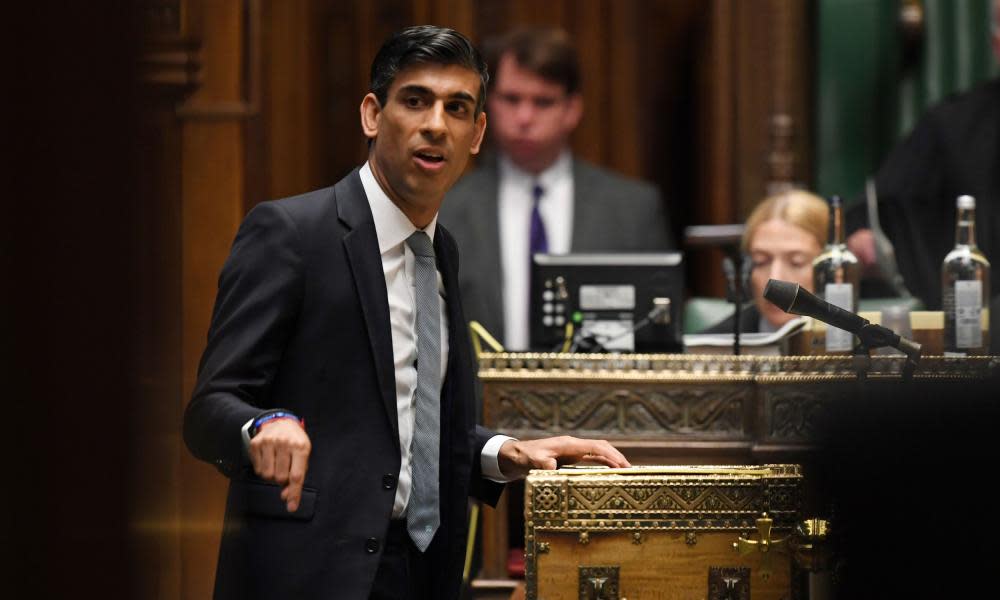Rishi Sunak’s ‘plan for jobs’ does not go far enough

Your editorial (7 July) is right to insist that Rishi Sunak’s announcement of £3bn towards the costs of insulating and providing green heating for some housing and public premises must be a “down payment” towards decarbonising the 30m buildings in the UK. However, to guarantee young people a stake in this green future, much of the £2bn for jobs for the under-25s should be rolled into this programme. Energy efficiency gets beyond the generalised blether about jobs, because it involves the specific skills of builders, plumbers, electricians, and heating and air conditioning engineers.
The government’s next step must be to move towards its well-received manifesto commitment to make £9.2bn available to such projects. To ensure this becomes a political priority, it is crucial to realise the vast number of jobs in every constituency that such a programme would entail. To meet the government’s net zero carbon goal by 2050 will require up to 20,000 homes and buildings being made energy-tight every week for the next 30 years. Another unrecognised job generator is the fact that gas heating in more than 20m homes will need to be replaced predominantly by heat pumps – that’s hundreds of thousands required annually.
Finally, jobs will also be generated in every community by providing charging points for e-vehicles and a broadband upgrade everywhere, and by shifting from spending £23bn on new roads to filling in dangerous potholes in existing ones.
Colin Hines
Convenor, UK Green New Deal Group
• We are concerned that there was no mention of disabled jobseekers in the chancellor’s summer statement (Mass unemployment feared despite Rishi Sunak’s ‘plan for jobs’, 8 July).
Even before the pandemic, the unemployment rate for disabled people was almost double that of non-disabled people, and history has shown that disabled people are disproportionately affected in times of economic recession.
Disabled jobseekers face specific barriers when accessing employment which are rarely addressed in generic employment programmes. We urge the chancellor to review investment in specialist programmes, such as Access to Work. These are a proven lifeline to disabled people and provide practical support for employers. Disabled people must not be left behind.
Diane Lightfoot
CEO, Business Disability Forum
• In the process of putting Humpty back together again, we should use the funds that are suddenly available for young jobseekers to build an accessible ladder of credentialed training, from school to further and higher education, that will generate a skilled social care workforce. Offering fair wages for the early steps on the ladder will help to redress young adult unemployment and open up pathways into professions allied to medicine as well as medicine itself.
Over the past five years I have visited more than 30 university-level health and social work training programmes around the UK. There has been progress in role expansion and mixing, eg nurse paramedics. Now is the opportunity to put the feeder systems in place – and they needn’t be restricted to the under-25s. Then we will have a sound workforce for a nationalised care system.
Sue Rabbitt Roff
Cellardyke, Fife
• Clearly the chancellor’s under-25s job creation scheme is to be welcomed. Having implemented youth training schemes in the 1980s and Future Jobs Fund projects in this century, I am concerned that lessons have not been learned from these.
One lesson is that local initiatives perform better. Second, adequate training and careers advice must be provided, particularly for the most disadvantaged, who need more support; this costs more but in the end is cost-efficient as it pays for itself. Third, setting unrealistic targets with inadequate supervision will only encourage unscrupulous private sector employers to cut corners to reach these; they must be tightly controlled.
Don Macdonald
Chair, LFJ Youth Integration
• It appears that the chancellor has earmarked at least £2bn to cover the wages and associated costs of firms hiring young school leavers for six months, and the money is accessible even to those firms which impart only the skill of making tea at the workplace. Would the firms have to return any part of this money to the government if the young people cannot subsequently find employers willing to hire them?
Shanti Chakravarty
Emeritus professor of economics, Bangor University
• Join the debate – email guardian.letters@theguardian.com
• Read more Guardian letters – click here to visit gu.com/letters

 Yahoo News
Yahoo News 
